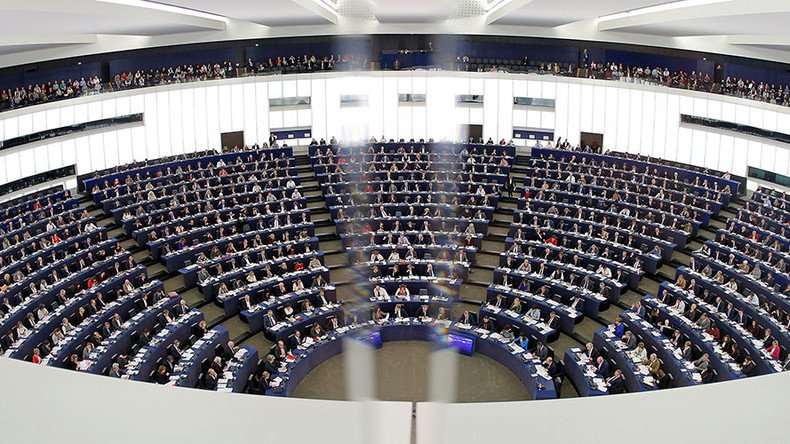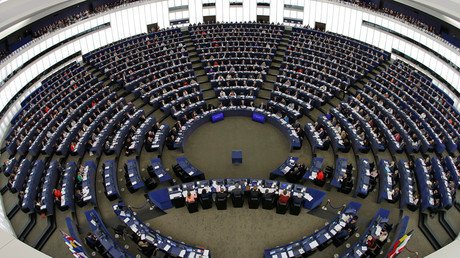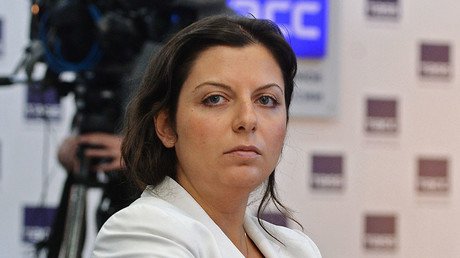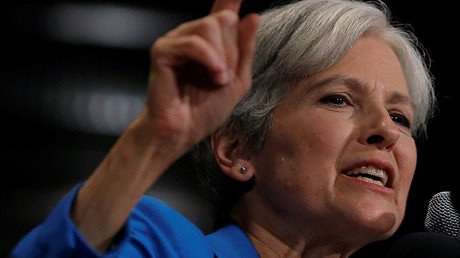‘Delusional call for war’: MEPs denounce anti-Russian ‘propaganda’ resolution

The European Parliament’s resolution against Russian media is an attack on freedom of information and an attempt to deprive Europeans of their right to make their own judgements, MEPs who oppose the “unthinkable and absurd” decision told RT.
On Wednesday, members of the European Parliament voted on the “proposal for resolution on the strategic communication from the European Union to counter propaganda against third parties”, with 304 MEPs voting in favor, 179 against and 208 abstaining. The motion, drafted by Polish MEP Anna Fotyga, is intended as a response to what the EU claims to be “propaganda and misinformation” from Russia. The document singles out RT, Sputnik news agency, the Rossotrudnichestvo federal agency and the Russkiy Mir (Russian World) fund as being particularly devious tools of propaganda, and puts Russian media in the same basket with Islamic State (IS, formerly ISIS/ISIL).
The “delusional” proposal reflects the “worst years of the Cold War” and represents a “frontal attack on freedom of information”, according to Spanish United Left MEP and vice president of the Foreign Affairs Committee of the European Parliament, Javier Couso.
“RT and Sputnik are both funded by the [Russian] government, just as other EU agencies which have an anti-Moscow stance. It’s not propaganda, it is information and what is clear from this report is that the EU is calling to restrict the rights of Europeans to sources of information that they choose,” the Spanish MEP told RT. “It is as if they said in the EU we should be forbidden to view CNN or Fox News because they are propaganda for the US, an unthinkable and absurd thing!”
“I do not know what Fotyga thought of how the media covered the war in Iraq and the manufacture of false evidence, but she certainly has no legitimacy in deciding what media Europeans should consult, nor make a blacklist of supposed media propaganda,” he added.
Additionally, the Spanish MEP argued that the report did ”great harm to the values and rights the EU claims to defend.” He described the document as “an insult to the intelligence of the Europeans, who are not assumed to have the ability to differentiate, choose and have a critical attitude towards the media and its information.”
Couso believes that “it is obvious that Europe has more important issues to deal with,” and in fact, “one of them is their relationship with Russia, which although some groups of the European right do not like, it is a strategic neighbor [of the] EU and member of the Security Council of the UN.”
When it comes to its relationship with Russia, “the EU is going in the opposite direction [of common sense],” Couso said. The proof of this lies in a “breach of agreements after the fall of the USSR, agreements that affected the positioning of strategic troops and the non-expansion of NATO into Russia’s security spaces.”
Couso’s colleague, Stelios Kouloglou, an MEP from Greece, on behalf of Syriza, believes that the whole resolution looks like it came straight from the seventies, and the ones who voted for it seemingly missed the end of the Cold War.
“For a lot of people, this reminds of a Cold War. It’s like we were talking in the '80s, in the 70s, about the Soviet Union. It was a propaganda. What we were discussing were the measures of propaganda. It looks like people were not aware that the Berlin wall has fallen,” Kouloglou told RT.
The resolution also places Russian media alongside IS’ propaganda efforts.
“The other thing that is really outrageous that this resolution puts in the same basket Russian Federation and the Islamic State. This really jeopardizes and undermines the fight against terrorism. We should have been together, in the same side both Russian Federation, and the European Union, and the United States. This is not the case with this resolution, so really that’s why a lot of people did not like it at all and they either abstained or voted against,” Kouloglou added.
The Greek MEP said that apart from accusations, the resolution backers did not produce any evidence of alleged Russian wrongdoings. Besides that, the MEP believes that the EU parliament should not really work on any ‘propaganda’ measures, since it’s unnecessary warmongering, hurting international relations and preventing mutual problems from being solved.
‘EU betrays own principles’: RT’s editor-in-chief slams ‘free speech doublethink’. READ MORE: https://t.co/XNi8lCzTTRpic.twitter.com/RKByq8bDjk
— RT (@RT_com) 24 ноября 2016 г.
“I didn’t [hear] any substance, you know. There’s propaganda also coming from the western media. I can tell you what happened to Greece last year, when there was propaganda against Greece by the major media. They were working all together. That was a propaganda against the elected government, freshly elected government,” the Greek MEP said. “So what are we talking about? Is a parliament responsible for discussing and voting on measures of counter-propaganda and propaganda? No. It’s part of a … war.”
“Instead of trying to find a common language, instead of trying to stay peaceful together, to have growth, development. Europe is suffering from economic crisis, and Russia also. So we have to have common practices and common goals. Instead of that we’re fighting. This is a call for war, not a call for peace.”
"The report is unjustified, it's not objective and is one-sided,"Greek Independent MEP, Notis Marias told RT, adding that the total number of lawmakers who voted against the resolution or abstained from voting shows that "the majority of the MEPs in this house do not actually accept" it. Many of those who supported the document are from eastern Europe, Marias said, while those representing the southern part of the bloc either abstained or voted against it.
"I find that the resolution is going the wrong way, because we need to have better relations with Russia, which is better for the European economy, for security and this is the new trend in the United States that we have to take into account," he added.
Another Greek MEP, Sotirios Zarianopoulos, representing the Communist Party of Greece, called the EU Parliament’s resolution “a monument of anticommunism” and a “gift to the Nazis,” aimed not only at Russian media, but the opposition within the EU itself.
“It was a very antidemocratic decision, because this resolution penalizes all the political action that is the European Union, against the bourgeois classes, that have the power in the countries of the European Union. That means that everyone in the European Union, that ... unemployed people ... low-wage people, many people who lose their jobs, and they accuse the EU for this, is suspect[ed of] anti-European Union propaganda. And ... speech and ... political action is penalized,” Zarianopoulos told RT.
“It’s the expression of antagonisms of capitalist powers in the European Union with other powers all over the world. And the victims, as usual, are the simple people.”
Fabio Massimo Castaldo, Italy’s MEP on behalf of Movimento 5 Stelle, believes that the resolution is both “unbalanced and unfair” and is an “insult” to Russia.
“We strongly criticize this kind of approach, because we consider there’s no possible comparison… between one important player like Russia… with the terrorists. This is something completely ridiculous. We think, also, this idea [the resolution]… it’s a kind of a strong insult… In this report the most important paragraph was about Russia, not about ISIS… this resolution [was] completely unbalanced,” Castaldo told RT. “In a pluralistic society we should not have any kind of fear… of different opinions.”
The statements, views and opinions expressed in this column are solely those of the author and do not necessarily represent those of RT.
















